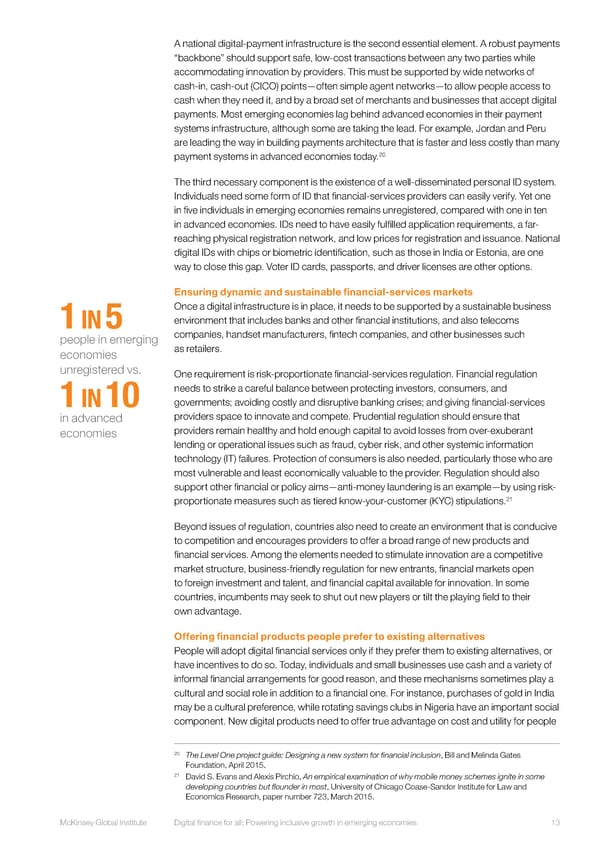A national digital-payment infrastructure is the second essential element. A robust payments “backbone” should support safe, low-cost transactions between any two parties while accommodating innovation by providers. This must be supported by wide networks of cash-in, cash-out (CICO) points—often simple agent networks—to allow people access to cash when they need it, and by a broad set of merchants and businesses that accept digital payments. Most emerging economies lag behind advanced economies in their payment systems infrastructure, although some are taking the lead. For example, Jordan and Peru are leading the way in building payments architecture that is faster and less costly than many 20 payment systems in advanced economies today. The third necessary component is the existence of a well-disseminated personal ID system. Individuals need some form of ID that financial-services providers can easily verify. Yet one in five individuals in emerging economies remains unregistered, compared with one in ten in advanced economies. IDs need to have easily fulfilled application requirements, a far- reaching physical registration network, and low prices for registration and issuance. National digital IDs with chips or biometric identification, such as those in India or Estonia, are one way to close this gap. Voter ID cards, passports, and driver licenses are other options. Ensuring dynamic and sustainable financial-services markets Once a digital infrastructure is in place, it needs to be supported by a sustainable business 1 IN 5 environment that includes banks and other financial institutions, and also telecoms people in emerging companies, handset manufacturers, fintech companies, and other businesses such economies as retailers. unregistered vs. One requirement is risk-proportionate financial-services regulation. Financial regulation needs to strike a careful balance between protecting investors, consumers, and 1 IN 10 governments; avoiding costly and disruptive banking crises; and giving financial-services in advanced providers space to innovate and compete. Prudential regulation should ensure that economies providers remain healthy and hold enough capital to avoid losses from over-exuberant lending or operational issues such as fraud, cyber risk, and other systemic information technology (IT) failures. Protection of consumers is also needed, particularly those who are most vulnerable and least economically valuable to the provider. Regulation should also support other financial or policy aims—anti-money laundering is an example—by using risk- 21 proportionate measures such as tiered know-your-customer (KYC) stipulations. Beyond issues of regulation, countries also need to create an environment that is conducive to competition and encourages providers to offer a broad range of new products and financial services. Among the elements needed to stimulate innovation are a competitive market structure, business-friendly regulation for new entrants, financial markets open to foreign investment and talent, and financial capital available for innovation. In some countries, incumbents may seek to shut out new players or tilt the playing field to their own advantage. Offering financial products people prefer to existing alternatives People will adopt digital financial services only if they prefer them to existing alternatives, or have incentives to do so. Today, individuals and small businesses use cash and a variety of informal financial arrangements for good reason, and these mechanisms sometimes play a cultural and social role in addition to a financial one. For instance, purchases of gold in India may be a cultural preference, while rotating savings clubs in Nigeria have an important social component. New digital products need to offer true advantage on cost and utility for people 20 The Level One project guide: Designing a new system for financial inclusion, Bill and Melinda Gates Foundation, April 2015. 21 David S. Evans and Alexis Pirchio, An empirical examination of why mobile money schemes ignite in some developing countries but flounder in most, University of Chicago Coase-Sandor Institute for Law and Economics Research, paper number 723, March 2015. McKinsey Global Institute Digital finance for all: Powering inclusive growth in emerging economies 13
 EXECUTIVE SUMMARY Page 12 Page 14
EXECUTIVE SUMMARY Page 12 Page 14